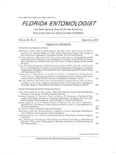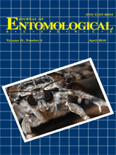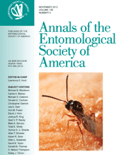
BIOCONTROL
Scope & Guideline
Unveiling the dynamics of biological control for a greener tomorrow.
Introduction
Aims and Scopes
- Biological Control Mechanisms:
The journal focuses on understanding the diverse mechanisms of biological control, including parasitism, predation, and competition among organisms, which play critical roles in regulating pest populations. - Ecological Interactions:
It emphasizes the ecological interactions between biological control agents and their environments, including the roles of host specificity, multitrophic interactions, and community dynamics in successful pest management. - Innovative Applications:
The journal highlights innovative applications of biological control, such as the use of entomopathogenic fungi, nematodes, and bacteria, alongside companion planting and integrated pest management strategies. - Impact Assessments:
Research published in 'BIOCONTROL' often examines the economic and ecological impacts of biological control programs, providing insights into their effectiveness and sustainability. - Emerging Technologies:
The journal explores the integration of molecular techniques and biotechnological advancements in enhancing the efficacy of biological control agents.
Trending and Emerging
- Sustainable Agricultural Practices:
There is a growing emphasis on sustainable agricultural practices that integrate biological control with other pest management strategies, highlighting the importance of ecological sustainability and resilience in food systems. - Molecular and Genetic Approaches:
Recent publications indicate a trend towards the use of molecular and genetic techniques to enhance the understanding and application of biological control agents, including genetic modifications and molecular markers. - Climate Change Impacts:
Research addressing the impacts of climate change on biological control dynamics is increasingly prominent, focusing on how changing environmental conditions affect the efficacy and behavior of biological control agents. - Urban and Peri-Urban Biocontrol:
An emerging theme involves the exploration of biological control in urban and peri-urban environments, recognizing the role of green spaces and urban gardens in pest management. - Multi-Trophic Interactions:
There is a notable trend towards studying multi-trophic interactions, where researchers investigate the complex relationships between plants, herbivores, and their natural enemies, enhancing the understanding of ecosystem dynamics.
Declining or Waning
- Classical Biological Control:
There has been a noticeable decline in research focused solely on classical biological control methods, which traditionally involved the introduction of natural enemies to control invasive species. This shift may be due to increased interest in more integrated and sustainable pest management approaches. - Chemical Interactions:
Research specifically centered on chemical interactions between pests and biological control agents is less frequently addressed, indicating a potential waning interest in this aspect in favor of broader ecological studies. - Invasive Species Management:
Although still relevant, the frequency of publications solely focused on the management of invasive species using biological control has decreased, as researchers are increasingly addressing broader ecological impacts and multi-species interactions.
Similar Journals

APPLIED ENTOMOLOGY AND ZOOLOGY
Advancing knowledge in insect science for a sustainable future.Applied Entomology and Zoology, published by Springer Japan KK, is a pivotal journal in the field of insect science, with an impressive track record since its inception in 1966. This esteemed publication, bearing ISSN 0003-6862 and E-ISSN 1347-605X, contributes significantly to the understanding of applied entomology, emphasizing research that supports sustainable agricultural practices and the ecological conservation of insects. Ranked in the Q2 category (2023) for Insect Science with a Scopus rank of #65 out of 181, it is recognized for its rigorous peer-review process and high-quality contributions that push the boundaries of our knowledge. Although it does not currently offer open access, the journal remains an essential resource for researchers, professionals, and students eager to advance their understanding of the complex interactions between insects and their environment. With a focus on practical applications, it aims to bridge the gap between entomological research and real-world implications, fostering innovation and promoting informed decision-making within the scientific community.

PEST MANAGEMENT SCIENCE
Transforming Pest Management for a Sustainable FuturePEST MANAGEMENT SCIENCE, published by John Wiley & Sons Ltd, stands as a leading journal in the realms of agronomy, crop science, and insect science. With an impressive Q1 ranking in these disciplines, as well as in miscellaneous medicine, this journal boasts a commendable influence within the academic community, reflected by its position within the top percentiles of Scopus rankings—ranked #7 out of 181 in Insect Science and #43 out of 406 in Agronomy and Crop Science. Covering a broad spectrum of pest management strategies and methodologies, it serves as an essential resource for researchers and professionals aiming to advance their knowledge and practices in sustainable agriculture and pest control. The journal’s commitment to open access ensures that cutting-edge research is widely disseminated, contributing significantly to global agricultural productivity and ecological sustainability. With coverage extending from 2000 to 2024, PEST MANAGEMENT SCIENCE remains pivotal in shaping the future of pest management.

BULLETIN OF INSECTOLOGY
Innovating Research in Insect BiologyBULLETIN OF INSECTOLOGY is a prominent academic journal published by ALMA MATER STUDIORUM, UNIV BOLOGNA, Italy, specializing in the field of Insect Science. The journal, with ISSN 1721-8861 and E-ISSN 2283-0332, has established itself as a vital resource for researchers and professionals interested in the diverse aspects of entomology and its applications. It ranks in the Q2 category for Insect Science as of 2023, placing it among the top journals in its field with a Scopus rank of 79 out of 181. The BULLETIN OF INSECTOLOGY is committed to disseminating high-quality research and innovative studies, facilitating open dialogue and collaboration among scientists. As an essential platform for sharing groundbreaking findings, it contributes significantly to the body of knowledge in agricultural and biological sciences, making it an invaluable asset for scholars and practitioners alike. With coverage from 2002 to 2024, this journal continues to foster advancements in entomological research and its importance in tackling environmental challenges.

FLORIDA ENTOMOLOGIST
Empowering Entomologists with Open Access KnowledgeFLORIDA ENTOMOLOGIST is a prestigious peer-reviewed journal dedicated to the advancement of entomological sciences, published by Walter de Gruyter GmbH. Since its transition to open access in 1994, the journal has become a vital resource for researchers, students, and professionals in the fields of Insect Science and Ecology, Evolution, Behavior, and Systematics. With an impact factor ranking high in its category—Q2 in Insect Science and Q3 in Ecology, Evolution, Behavior and Systematics—the journal showcases significant findings and contributions that shape our understanding of insect biology and its implications for ecological systems. The journal is indexed in Scopus, further establishing its relevance, with current rankings reflecting its competitive standing within Agricultural and Biological Sciences. Published continuously since 1982, FLORIDA ENTOMOLOGIST not only facilitates the dissemination of knowledge among entomologists but also encourages interdisciplinary collaboration, making it an essential publication for anyone invested in the scientific study of insects.

Persian Journal of Acarology
Unlocking the secrets of the microscopic world.The Persian Journal of Acarology, published by the Acariology Society of Iran, stands as a pivotal resource in the fields of Animal Science, Zoology, and Insect Science. Established in 2012 as an open-access platform, this journal provides researchers and academics with a rich repository of peer-reviewed articles focused on the study of acarology, encompassing both basic and applied research. With its current ranking in the Q3 category and significant Scopus rankings in related fields, the journal fosters scholarly communication among professionals, facilitating the advancement of acarology globally. The journal’s commitment to open access ensures that valuable research is available to a wide audience, supporting both emerging and established scientists in their pursuit of knowledge. With contributions from distinguished authors and a steady trajectory of growth, the Persian Journal of Acarology is a vital tool for those invested in the future of acarological studies and applied entomology.

PHYTOPARASITICA
Pioneering Insights into Parasitic Relationships in Nature.PHYTOPARASITICA, published by SPRINGER in the Netherlands, is a distinguished journal dedicated to the fields of Insect Science and Plant Science. With an impressive convergence of research from 1973 to 2024, the journal holds a notable position in academic circles, ranking in Q2 for both categories as of 2023, according to Scopus metrics. This places PHYTOPARASITICA within the top 67th percentile for Insect Science and the 59th percentile for Plant Science, reflecting its significant impact on research and advancements in these crucial fields. The journal is committed to disseminating high-quality, peer-reviewed research that addresses the interplay between plants and their parasitic organisms, contributing to the broader understanding of agricultural sustainability and ecological balance. Researchers, professionals, and students will find this journal an essential resource for cutting-edge insights and developments within its domain.

JOURNAL OF ENTOMOLOGICAL SCIENCE
Exploring the Frontiers of Insect ScienceJOURNAL OF ENTOMOLOGICAL SCIENCE, published by the Georgia Entomological Society Inc, is a crucial resource in the field of insect science and ecology. With a rich history since its inception in 1993, the journal provides a platform for innovative research and comprehensive reviews addressing various aspects of entomology. Although not an open-access journal, it is highly regarded within its community, holding a Q3 ranking in Agronomy and Crop Science, Ecology, Evolution, Behavior and Systematics, and Insect Science as of 2023. Each issue promises to contribute valuable insights to professionals, researchers, and students alike, making it an essential publication for those looking to stay abreast of developments in entomological studies. The journal's editorial commitment ensures that it remains at the forefront of entomological research through rigorous peer reviews and a dedication to scholarly excellence.

EXPERIMENTAL AND APPLIED ACAROLOGY
Transforming Acarology Knowledge into Practical SolutionsEXPERIMENTAL AND APPLIED ACAROLOGY is a leading international journal that serves as a premier platform for the dissemination of cutting-edge research in the fields of Ecology, Insect Science, and Medical applications related to acarology. Published by Springer, this esteemed journal has been pivotal in advancing our understanding of mite-related science since its inception in 1985, and it anticipates continued publication until 2024. With an impressive ranking in the Q2 quartile across multiple categories, including Ecology (Rank #154/461) and Insect Science (Rank #42/181), it firmly establishes itself as a significant contributor to the scientific community. Although not an Open Access journal, its rigorous peer-review process ensures high-quality publication standards, appealing to researchers, professionals, and students alike. Aiming to bridge gaps between experimental research and practical applications, EXPERIMENTAL AND APPLIED ACAROLOGY plays a crucial role in enhancing knowledge and discoveries related to acarology, highlighting its vital importance in ecology and health sciences.

Insects is a prominent open-access journal published by MDPI, dedicated to advancing research in the vibrant field of insect science. Since its inception in 2011, this journal has become a vital resource for academics and professionals alike, also ranked in the prestigious Q1 category within the Insect Science field by Scopus, achieving a remarkable rank of 26 out of 181 journals. With an ongoing convergence period from 2010 to 2024, Insects provides comprehensive coverage of various aspects of entomology, including but not limited to ecology, behavior, physiology, and applied entomology. Based in Switzerland, the journal promotes an open-access model, ensuring that vital research is readily available to researchers, practitioners, and students globally. This journal not only facilitates the dissemination of groundbreaking entomological research but also fosters collaboration and interdisciplinary dialogue in the field.

ANNALS OF THE ENTOMOLOGICAL SOCIETY OF AMERICA
Exploring the Intricacies of Insect LifeANNALS OF THE ENTOMOLOGICAL SOCIETY OF AMERICA is a premier journal dedicated to advancing the field of insect science, published by Oxford University Press. With an impressive impact factor and classified in the Q1 quartile for its category, this journal ranks among the top publications in agricultural and biological sciences, specifically within insect science, positioned at #28 out of 181, indicating its significant influence and high-quality research contributions. The journal aims to disseminate original research, comprehensive reviews, and groundbreaking findings that enhance our understanding of entomology, spanning across ecological, evolutionary, and applied segments. With a consistent publication history since 1938, researchers, professionals, and students will benefit from the wealth of knowledge presented in its pages. Although the journal does not currently offer open access, it remains a vital resource for those seeking to stay at the forefront of entomological research and innovation.